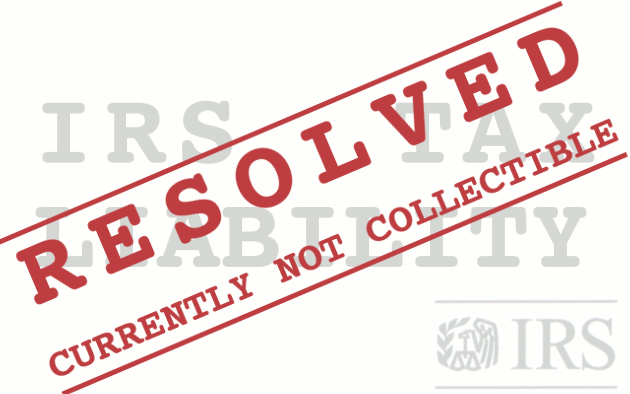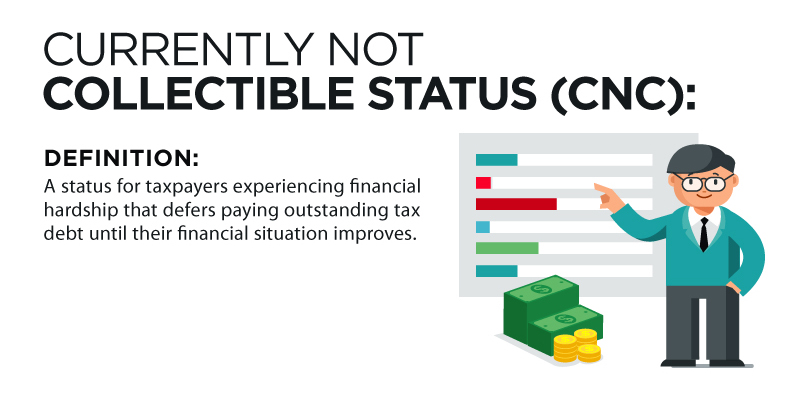
100+ Years of Combined Tax Resolution Experience.
100+ Years of Combined Tax Resolution Experience.
At first glance, it seems like “Currently Not Collectible” is a great idea.
It gets the IRS off your back and forces them to leave you alone. And you can breathe a sigh of relief. Right?
Well, yes and no.
The upside to “Currently Not Collectible” is that yes, the IRS does acknowledge that you are living in financial hardship and cannot pay your tax debt right now. (This means having little to no leftover money after paying essential living expenses each month.) And they “leave you alone” for a while. They hold off on collecting past due taxes, they won’t garnish your wages or levy your bank account, and they stop all collection activity.
The downside is that those debts don’t go away. They’re just “currently” not collectible, not “forever” not collectible.” And – surprise – the balance continues to collect late penalties and interest. Plus, you don’t get to keep any future tax refunds – the IRS pockets them towards your debt. And the IRS can still file a lien against you – it’s called a Notice of Federal Tax Lien, and it shows up on your credit report and lets creditors know that you owe lots of tax debt. So, good luck buying a car.
The idea is that you get out of “Currently Not Collectible” status sooner rather than later. It can provide some breathing room for you to get back on your feet – but it isn’t designed to take away your tax worries forever. It just puts them on the back burner for a while.
How Long is “Currently?”
You don’t get to decide when you’re ready to pay your tax debt back (another common misconception.) The IRS does. Based on your individual case, the IRS inputs a “closing code” on your file that dictates the amount of money you need to earn in order to start paying your tax debt again. Then they watch to see if you make the threshold.
If you file a tax return that pings the closing code and reaches the amount they’ve set, then your debt will be moved back into “Collectible” status. And all your problems will start over again.
Is “Currently Not Collectible” Status Worth The Trouble?
Here’s a brief rundown of what you need to do to file for Currently Not Collectible status. (Note: We’re delighted to help you with this! It’s what we do. But it’s still a lot of work.)
- Gather all your documents. (This includes bank statements for the last three months, a list of all your assets and their market values, a tally of all your monthly and living expenses, and proof of payment for out-of-pocket medical expenses.)
- Fill out the right form. It will be one of these: Form 433-A, Collection Information Statement for Wage Earners and Self-Employed Individuals, or Form 433-F, Collection Information Statement.
- Work through the IRS guidelines to see if you qualify. You can find those here. Financial Analysis Handbook in their Internal Revenue Manual (5.15.1)
- Submit your completed request to the IRS. This is also a lengthy process, and one that it’s best to have a tax professional to help you with.
And after that, you still might not get approved.
So the question is: Is “Currently Not Collectible” worth it to you?
Only you can decide that. (And only you can prevent forest fires.)
For more information on Currently Not Collectible status, you can read this: Currently Not Collectible (Internal Revenue Manual 5.16.1)
If you have any questions, give us a call at 844-841-9857, or schedule a free consultation here.
Read More About Currently Not Collectible Status
Additional Readings

What Is Currently Not Collectible Status and How Do You Qualify for It? Paying off your tax liability on top of your mortgage, car payment, insurance, utilities, and other living expenses can feel overwhelming. The IRS understands this and may consider you eligible for Currently Not Collectible (CNC) status. When you owe taxes but have little...

At first glance, it seems like “Currently Not Collectible” is a great idea. It gets the IRS off your back and forces them to leave you alone. And you can breathe a sigh of relief. Right? Well, yes and no. The upside to “Currently Not Collectible” is that yes, the IRS does acknowledge that you are...

Why Is the IRS Delaying Collections? The Answer Might Scare You With the outbreak of COVID-19, the IRS revealed they will be backing off collections for a short period of time. If you owe taxes, you likely breathed a sigh of relief and put solving your tax problems even further on the back burner. But is this too good to...

We’re in an era in which more small businesses are launching like wildfire. Many people find starting a small business of their own as easy as a piece of cake. However, most of the time, what they fail to prioritize are some of the major players involved in smoothly operating their small business. A...

Do you know why most married taxpayers go for filing joint tax returns? It’s actually because of the benefits that it offers. But with joint tax returns, both the filers hold the responsibility for the tax bill or any penalties and interest that arise from it. Both are legally responsible for the entire liability, even...

What if you owe so much in taxes that you can’t see your way out of it? If you owe back taxes, you might not think there is a way you can ever pay things off. And the more those back taxes have accumulated, the deeper the hole. But that doesn’t mean you can’t dig...
